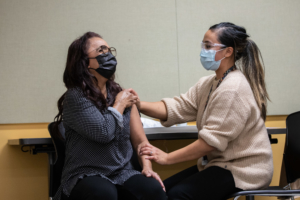The World Bank Group Announces a $12 Billion Initiative
 The World Bank Group has announced a $12 billion initiative that would allow COVID-19 vaccines, testing and treatments to be readily available for low-income countries. This plan will positively affect up to a billion people and signals the World Bank’s initiative to ensure that developing countries are equipped to distribute vaccines and testing to citizens. The plan is a part of the overall $160 billion package by the World Bank Group, which aims to support developing countries in the fight against the pandemic.
The World Bank Group has announced a $12 billion initiative that would allow COVID-19 vaccines, testing and treatments to be readily available for low-income countries. This plan will positively affect up to a billion people and signals the World Bank’s initiative to ensure that developing countries are equipped to distribute vaccines and testing to citizens. The plan is a part of the overall $160 billion package by the World Bank Group, which aims to support developing countries in the fight against the pandemic.
A Multitude of Goals
Since early March 2020, the World Bank Group has provided grants to low-income countries to help with the distribution of health care equipment. Recognizing that the pandemic disproportionately impacts the impoverished and has the potential to push up to 115 million more people into poverty, the World Bank Group has been active in financing an early, timely response to the COVID-19 pandemic in low-income areas. As of November 2020, the World Bank Group has assisted more than 100 developing countries in the allocation of medical supplies and technologies.
With the spread worsening all across the globe, the next step is to administer vaccinations. This new initiative hopes to strengthen health care operatives while also providing economic opportunities within those communities. Other expectations are increasing awareness of public health, training health care workers and focusing on community engagement. As a result, the four primary goals of the World Bank Group’s Crisis Response are to save lives that are endangered by the COVID-19 virus, protect the impoverished and vulnerable, retain economic stability and facilitate a resilient recovery to the pandemic.
Moreover, the World Bank Group has extensive experience with dispersing vaccines, specifically for combating infectious diseases like tuberculosis and malaria. Through these experiences, the World Bank Group understands the importance of quick, tailored distribution based on individual country needs. As a result, countries will have flexibility in how to receive and administer vaccines — for example, through the improvement of health care infrastructure, procurement with the support from varying, multilateral mechanisms or reshaping policy and regulatory frameworks.
Partnerships and Funding
Funding for this project will consist of “$2.7 billion new financing from IBRD; $1.3 billion from IDA, complemented by reprioritization of $2 billion of the Bank’s existing portfolio; and $6 billion from IFC, including $2 billion from existing trade facilities.”
The IDA will provide grants to low-income countries while the IBRD will be supplying grants to middle-income countries. The World Bank’s private sector arm, the IFC, will be the main donor for continued economic stability within its clientele. The IFC’s support will specifically aid in the continuation of operating and sustaining jobs. The total funding will cover a broad scope to strengthen the health care sector. These solutions hope to reduce the harmful economic and social impacts of COVID-19.
World Bank Group president, David Malpass, has been working extensively with these institutions on this project. Malpass pointed out that the need for economic backing is significantly important when it comes to receiving this vaccine. Manufacturers might not deem these low-income communities as important as those in more advanced economies. Hence, it is extremely important to provide this funding to ensure global vaccine equity.
Moving Forward
Many countries have been able to discover viable vaccine treatments. It is important to distribute future doses globally and equitably as COVID-19 pushes more and more people into extreme poverty. Malpass wrote, “The pandemic is hitting developing countries hard and the inequality of that impact is clear … The negative impact on health and education may last decades — 80 million children are missing out on essential vaccinations and [more than] a billion are out of school.”
As the number of global cases increases each day, it is becoming even more important to provide relief to all countries. Low-income countries and communities are the most vulnerable. For this reason, the World Bank Group makes it transparent that its main mission is to provide extended relief to these countries during the pandemic.
– Natalie Whitmeyer
Photo: Flickr
